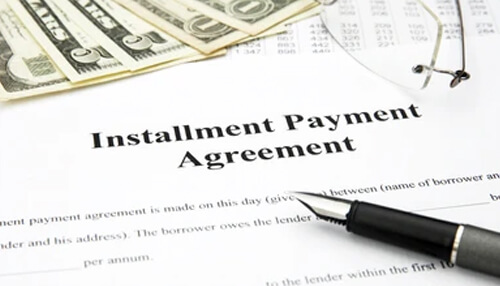Having a partial payment installment agreement with the IRS can be beneficial, especially when you don’t have the necessary funds to fully pay what you owe. In this article, we discuss ways to start out paying the tax owed through installments and how the IRS will respond.
What is an Installment Agreement?
Installment agreements are a popular way for taxpayers to pay their taxes. They allow you to spread out the tax payments over time, which can make the process more manageable.
Generally, an installment agreement depends on two essential facts: the amount owed and the due dates. You will need to provide the IRS with reliable information about your income, your estimated taxes, and the due dates of your upcoming tax payments.
If you have a partial payment agreement in place, you will need to include a statement from your lender confirming that they will advance the full amount of your installment agreement by the agreed upon due date. Failure to do so can result in late payment penalties and additional interest charges.
When the IRS requires a partial payment installment agreement
If you are due a tax refund, the IRS may require you to enter into a partial payment installment agreement. This type of agreement allows you to make periodic payments over a certain period of time, usually 12 months. The advantage of this type of agreement is that it prevents interest and penalties from accumulating on your tax debt. Additionally, it helps the IRS track your progress and ensure that you are meeting all required monthly payments.
To get started, create a professional overview of your finances with our free Personal Financial Planning tool. This will help you identify any debts or credit concerns that should be taken into account when negotiating an installment agreement with the IRS. Once you have clarity on your budgetary situation and any outstanding debts or liabilities, it is easier to anticipate how much money you can afford to pay each month. Additionally, make sure to keep updated on IRS regulations so that you remain compliant with the terms of the installment agreement.
If you are interested in entering into a partial payment installment agreement with the IRS, please contact our office for a confidential consultation. We would be happy to walk you through the process and answer any questions you may have about this unique way to resolve your tax debt.
How to get an Installment Agreement with the IRS
If you owe the IRS money and would like to pay them in smaller installments, you may be able to get a partial payment installment agreement. This agreement will allow you to pay the IRS over time using regular payments rather than all at once.
Program Interest Charges and Penalties
If you receive a partial payment from an individual or company, the IRS may charge you interest and penalties on that payment. Interest and penalties are often assessed when payments are not fully made by the due date. This article explains program interest charges and penalties and how to avoid them.
When you file your taxes, the IRS charges interest on late payments starting from the date of the payment that is more than 21 days after the date it was due. The interest rate is determined by your tax bracket multiplied by 100%. For example, if your taxes are due on April 15th but you only pay them on May 5th, the interest charged is 8% x $10 = $80. This charge is added to the total tax refund you receive.
If you don’t have enough money to cover both your outstanding tax liabilities and any interest and penalties that have been charged, the IRS will collect these amounts through seizure of assets (such as bank accounts or stock). If this happens, it can lead to significant financial difficulties for you. There are several strategies you can use to minimize your chances of having assets seized by the IRS.
Reduce Payments by Deducting Other Taxable Income
If you owe taxes and owe money in back taxes, your only recourse may be to attempt to negotiate a payment installment agreement with the IRS. If you are facing a lot of back taxes and feel like you simply cannot pay the outstanding amount all at once, a partial payment installment agreement may be a good option for you. When negotiating a payment installment agreement with the IRS, keep in mind that you will need to prove to them that other taxable income can be deducted from your settlement amount. By taking these steps, you may be able to reduce the amount you have to pay each month and ultimately receive your debt resolved more quickly.



